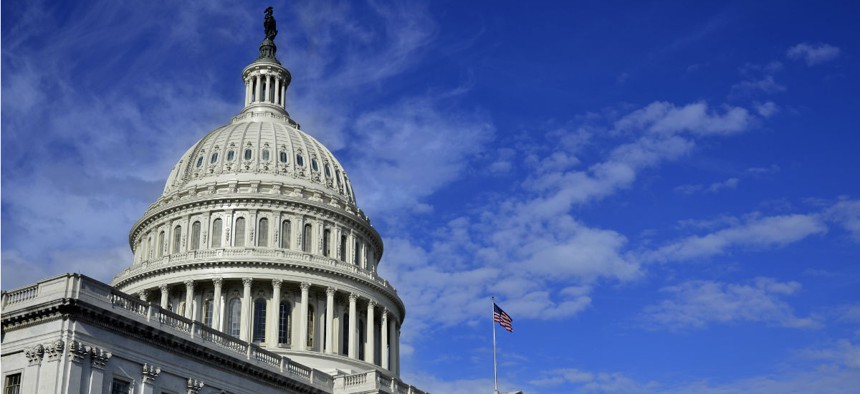
Lane V. Erickson / Shutterstock.com
Lawmakers Expect Massive Spending Bill Tuesday, Face Tight Turnaround to Avoid Shutdown
Despite budget deal, omnibus unveiling has been repeatedly delayed by outstanding issues.
Lawmakers plan to unveil on Tuesday a $1.3 trillion bill to set spending levels at every federal agency, giving themselves just a few days to pass the funding measure and avoid the third government shutdown of the year.
The fiscal 2018 omnibus spending bill has been delayed after weeks of negotiations that commenced in earnest after President Trump signed into law a two-year budget deal that significantly boosted funding by temporarily rolling back 2011 Budget Control Act caps. That agreement boosted top-line spending levels by $63 billion for non-defense discretionary accounts, and the new measure would direct specific funding allocations under that agreement.
Lawmakers were initially hoping to unveil the omnibus last week to provide plenty of leeway to get it President Trump’s desk before the Friday deadline. Negotiators then said they would file the bill on Monday so the House could vote on the measure on Wednesday and send it to the Senate, but that plan was disrupted by lingering issues with the final agreement. Due to procedural rules, the House is now planning to vote Thursday.
Congress is working on a tight timeframe, with funding set to expire Friday evening. Lawmakers are eager to pass the bill without further delay, as they are scheduled to take a two-week recess as soon as they wrap up votes this week. Federal agencies are currently operating on their fifth continuing resolution of the fiscal year and have been forced to shutter twice, albeit for short durations. The new delay in unveiling the year-long spending measure increased the odds that Congress will have to once again fund agencies through a short-term stopgap to buy time as the omnibus winds its way through the chambers and to the White House for Trump’s signature.
Due to the overall uptick in spending, most agencies are expected to wind up with increases compared to their fiscal 2017 funding levels. Some agencies, however, such as the Environmental Protection Agency, are still expected to face cuts. The departments of Defense, Veterans Affairs and Homeland Security are expected to see the largest funding increases.
VA is also expected to see a major overhaul under the bill, which would consolidate various programs allowing veterans to receive private health care on the government’s dime and make it easier for them to receive such care. The plan has drawn significant controversy but a compromise has won the approval of at least some members of both parties in Congress, veterans service organizations and the Trump administration. Lawmakers have sought to eliminate rules for the Veterans Choice Program that require a veteran to live 40 miles from a VA facility or face a 30-day wait to receive care in order to become eligible for private care using taxpayer dollars. The omnibus also includes a plan to enable VA Secretary David Shulkin to assess VA’s footprint in each of its regions and make recommendations for facilities to close. Congress would have final say on the package of proposed closures, similar to the military’s base realignment and closure process.
Several provisions held up negotiations in recent weeks, such as policy riders to prevent federal dollars going toward abortions, a transportation project to build a tunnel between New York and New Jersey and President Trump’s proposed wall on the U.S.-Mexico border. Appropriators and congressional leaders were still negotiating those issues Tuesday.







